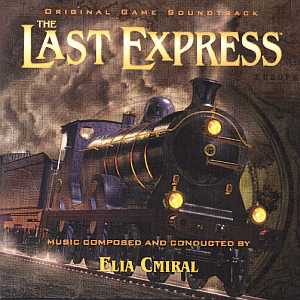Elia
CMIRAL
The Last Express
 OST
OST
 Intrada MAF 7089
[38:28]
Intrada MAF 7089
[38:28]

The game scoring industry can be an interesting change of pace for a composer.
This extremely successful computer game was most certainly a different style
of assignment for the European composer. Although he'd worked for film and
stage, this was to bridge the transition onto the Hollywood treadmill,
effectively paving the way to A-list scores he's now known for: Ronin,
Stigmata, and Battlefield Earth.
Most computer games are the result of a team of animators conjuring pixelised
creations from nothing. This one actually shot live actors, and then replaced
all characters and backgrounds with 2D animation - very much like Ralph Bakshi's
'80s version of The Lord of the Rings. So for all intents and purposes,
Cmiral really was scoring to a more literal motion picture.
The size of the ensemble worked with isn't credited, but the fact that he
performed his own electronic score is. In 40 minutes, an initial listen will
leave you with a dominant impression of the electronics, specifically rhythmic
percussion. Yet the flipside is a particularly nice use of solo violin, as
introduced in "Departure". This seems almost like a noble fanfare for the
locomotive itself. In his booklet notes, the composer explains how groups
of cues were developed - a game scoring technique that goes beyond the filmic
leitmotif approach. Groups of instruments and motives refer more to emotion
and repeat scenario as opposed to a particular character's re-appearance.
No cue is longer than 3 minutes, with many barely stretching 60 seconds.
What all this should tell you is that The Last Express is a finely crafted
game score, that it does give some promise toward the melodic side of the
composer, but this is largely a rhythmic exercise. "Pursuit" is a good suspense
cue demonstrating most of what a game score should do. "A Narrow Escape"
is another. In-between is a jumble of allsorts that is extremely hard to
characterise. As a memento of the game, or a curioso for those intrigued
by a composer's route into Hollywood it's intriguing. Otherwise, most soundtrack
collectors are likely to feel at a loss.
Paul Tonks

![]()
![]()
![]()
![]()
![]()
![]()
![]()
![]()
![]()
![]()
![]()
![]()
![]()
![]()
![]()
![]()